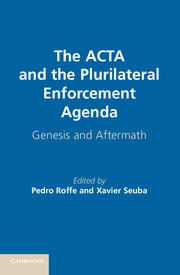Book contents
- Frontmatter
- Contents
- List of Contributors
- Foreword
- Acknowledgments
- Acronyms
- Introduction
- PART I THE FINAL ACT: ITS MAIN FEATURES AND CONTENTS
- 1 An Overview of the Agreement
- 2 ACTA Initial Provisions and General Definitions
- 3 ACTA General Obligations with Respect to Enforcement
- 4 Provisions on Civil Enforcement – Section 2 of ACTA
- 5 Legal Framework for Enforcement
- 6 ACTA and Beyond
- 7 ACTA’s Digital Chapter
- 8 The ACTA Committee
- PART II DOMESTIC LEGISLATIVE CHALLENGES
- PART III IMPACT ON RELATED PROCESSES
- PART IV VIEWS FROM STAKEHOLDERS: LESSONS
- PART V WHAT LIES AHEAD ACTA
- Annex I Anti-Counterfeiting Trade Agreement
- References
- Index
1 - An Overview of the Agreement
Contents and Features
Published online by Cambridge University Press: 05 December 2014
- Frontmatter
- Contents
- List of Contributors
- Foreword
- Acknowledgments
- Acronyms
- Introduction
- PART I THE FINAL ACT: ITS MAIN FEATURES AND CONTENTS
- 1 An Overview of the Agreement
- 2 ACTA Initial Provisions and General Definitions
- 3 ACTA General Obligations with Respect to Enforcement
- 4 Provisions on Civil Enforcement – Section 2 of ACTA
- 5 Legal Framework for Enforcement
- 6 ACTA and Beyond
- 7 ACTA’s Digital Chapter
- 8 The ACTA Committee
- PART II DOMESTIC LEGISLATIVE CHALLENGES
- PART III IMPACT ON RELATED PROCESSES
- PART IV VIEWS FROM STAKEHOLDERS: LESSONS
- PART V WHAT LIES AHEAD ACTA
- Annex I Anti-Counterfeiting Trade Agreement
- References
- Index
Summary
Introduction
The Anti-Counterfeiting Trade Agreement (ACTA) is a signed international agreement that is pending ratification and entry into force. Signature and initial membership are limited to the group of countries which participated in its negotiation, and others that may be agreed to by consensus. The negotiating participants are the member states of the European Union (EU) as well as Australia, Canada, Japan, South Korea, Mexico, Morocco, New Zealand, Singapore, Switzerland and the United States.
Negotiation of ACTA provoked controversy from the outset. Proponents characterised it as an exercise needed to address an ongoing threat to the interests of intellectual property right (IPR) owners, as well as to defend the public against risks posed by goods coming from unreliable sources. Opponents portrayed ACTA negotiations as driven by IPR holder groups intent on moving their high-protection agenda away from multilateral institutions towards a more hospitable forum. In the multilateral organisations, a range of interested groups participate in negotiations, and the results should appropriately balance legitimate interests (if common ground can be found). The ACTA negotiating forum, by way of contrast, was predisposed to favour particular IPR holder objectives.
The initially proposed ACTA texts threatened to create an international trade and technology transfer environment, including in digital space, with serious obstacles to access for important public goods, including medicines and information. Proposed criminalisation measures were unbalanced. Ultimately, a number of the most troublesome elements of the initial proposals were dropped, alleviating some of the most pressing worries.
- Type
- Chapter
- Information
- The ACTA and the Plurilateral Enforcement AgendaGenesis and Aftermath, pp. 31 - 45Publisher: Cambridge University PressPrint publication year: 2014



